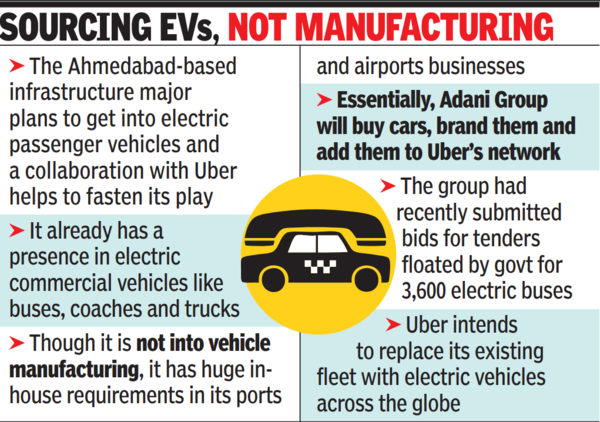The partnership also plans to bring the services of Uber under Adani One, which was launched in 2022.
These formed part of the discussions between Adani Group chairman Gautam Adani and Uber CEO Dara Khosrowshahi during their Feb 24 meeting.

The Ahmedabad-based infrastructure major plans to get into electric passenger vehicles and a collaboration with Uber helps to fasten its play. It already has a presence in electric commercial vehicles like buses, coaches and trucks. Though it is not into vehicle manufacturing, it has huge in-house requirements in its ports and airports businesses. Essentially, Adani will buy cars, brand them and add them to Uber’s network. It recently submitted bids for tenders floated by govt for 3,600 electric buses.
Uber intends to replace its existing fleet with electric vehicles across the globe, as it looks to transform itself into a zero-emission mobility platform before 2040.
The Adani-Uber partnership has the potential to boost the adoption of electric four-wheelers in India since manufacturers have been seeking commercial applications on a massive scale to become financially viable, and could become one of the largest electric vehicle fleet partnerships in the world for the US ride hailing platform.
The adoption of electric vehicles on a large scale could also give a big push to the gig economy in India. Uber, which entered India in 2013, has completed over 3 billion trips since then and is now available across 125 cities. According to the company, it has helped over 8 lakh Indians earn an income by getting into the driver’s seat.
The Uber tie-up will also fit well with Adani Group’s renewable energy push that is setting up a network of charging stations across India and will complete the loop by powering the electric vehicle fleet with green energy.
Further, the collaboration will also help expand Adani One, which offers a host of services such as flight bookings, holiday packages, airport services and cab bookings with Uber integration. The Adani Group has committed to investing $100 billion in India’s green energy transition over the next 10 years and plans to scale up to 10GW of solar manufacturing capacity by 2027. In India, Uber competes with Ola, which is also betting on EVs and is set for an IPO.